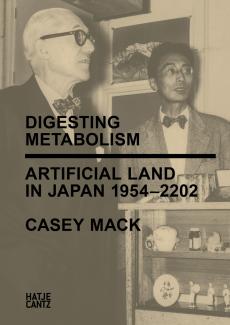Event

Panel discussion moderated by Dr. Ariel Genadt (Weitzman School of Design) in conversation with Casy Mack and Ivan Rupnik (Northeastern University). A book signing with the author will be held after the panel discussion.
Moving away from the focus on capsule architecture that dominates discussion of Japan’s Metabolist architects, the book Digesting Metabolism: Artificial Land in Japan 1954–2202 (Hatje Cantz, 2022) investigates the impact on Japanese housing of Le Corbusier’s idea of “artificial land.” Long buried by the term “megastructure” that it inspired, artificial land joins the individual and collective, envisioning housing as stacked platforms of plots for building freestanding homes of all variety. First introduced to Japan in 1954 by Le Corbusier’s protégé, Takamasa Yosizaka, artificial land is an essential concept for the Metabolists who debuted in Tokyo in 1960. Yet it has had a hold on Japan’s metabolic imagination well beyond the ’60s, promising domestic satisfaction and environmental resilience from the postwar period to today’s government policies. Drawing on texts not previously translated, the book will be discussed in terms of influences on its conceptualization and key projects showing artificial land’s diverse interpretations for an infrastructural approach to housing.
Casey Mack is an architect and the founder of Popular Architecture in Brooklyn, New York, an office combining simplicity and innovation in design work across multiple scales. Mack graduated with a B.A. in Art History from Vassar College and an M.Arch from Columbia, afterwards working with the Office for Metropolitan Architecture in Hong Kong and New York, and teaching urban design at the New York Institute of Technology and housing at Parsons. Mack’s work has been published in OASE, Harvard Design Magazine, the Avery Review, and in the proceedings of the 16th International Docomomo Conference, Inheritable Resilience: Sharing Values of Global Modernities. His book Digesting Metabolism was awarded "Best Publication in Architecture" for 2022 by Juanzong Books in Shanghai, selected by an international jury comprising scholars from the ETH and Tongji University.
Ariel Genadt is an architect, a scholar and lecturer. He has taught at the Weitzman School of Design since 2011, as well as at Swarthmore College and the Technion (Israel). He focuses on the relationships between construction technologies and architectural expression of climate and place. He also specializes in the architecture of modern Japan. Genadt has collaboraated as an architect on a wide range of projects in Europe, Asia and Africa. He was a JSPS Fellow researcher in Tokyo University (2012) and a Visiting Scholar at the Fondazione Renzo Piano, Genoa (2013-14). He curated the exhibition Critical Abstraction: Modern Architecture in Japan, at Penn’s Architectural Archives Gallery (2018) and was Associate Curator and Designer of the exhibition Building in China at Penn (2022).
Ivan Rupnik is an architect, researcher, and Associate Professor of Architecture at Northeastern University. In 2018, he cofounded MOD X, a research and advisory group focused on the growing offsite construction sector. Since its founding, MOD X has provided research and consulting support to leading companies, NGOs, and governmental agencies in the US and abroad, including the Modular Building Institute, the National Institute for Building Science and the US Department of Housing and Urban Development. His doctoral work at Harvard University focused on the knowledge transfer between architecture, construction and manufacturing that occurred in the first half of the twentieth century. He is the coauthor of Project Zagreb: Transition as Condition, Strategy, Practice (Actar, 2007) and Baku: Oil and Urbanism (Park Books, 2015) with Eve Blau and the author of A Peripheral Moment: Experiments in Architectural Agency (Actar Birkhauser, 2010). He served as an editorial board member and Associate Editor of the Journal of Architectural Education.
This event is co-sponsored by Weitzman and the Center for East Asian Studies.
If you require any accessibility accommodation, such as live captioning, audio description, or a sign language interpreter, please email news@design.upenn.edu to let us know what you need. Please note, we require at least 48 hours’ notice. If you register within 48 hours of this event, we won’t be able to secure the appropriate accommodations.